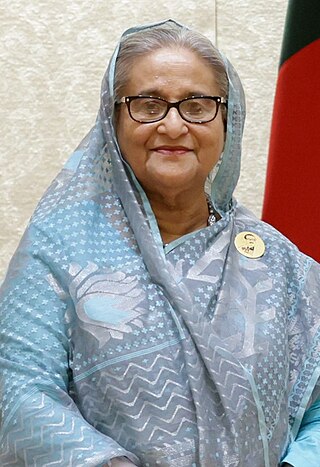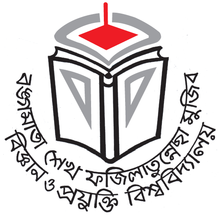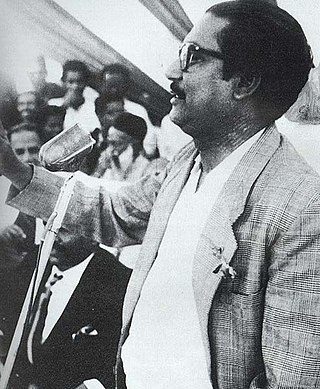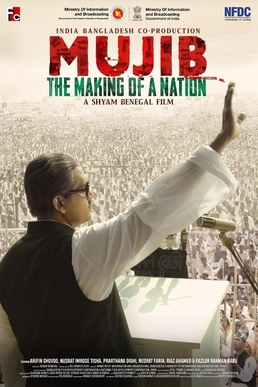Related Research Articles

Sheikh Hasina is a Bangladeshi politician who served as the tenth prime minister of Bangladesh from June 1996 to July 2001 and again from January 2009 to August 2024. She is the daughter of Sheikh Mujibur Rahman, the first president of Bangladesh. She served in the position of prime minister for over 20 years, making her the longest-serving prime minister in history of Bangladesh. Thus, she became the world's longest-serving female head of government. Her authoritarian regime ended in self-imposed exile following an uprising in 2024.

Sheikh Mujibur Rahman, the first president of Bangladesh, was assassinated along with most of his family members during the early hours of 15 August 1975 by a group of Bangladesh Army personnel who invaded his residence as part of a coup d'état. The Minister of Commerce, Khondaker Mostaq Ahmad, immediately took control and proclaimed himself head of an interim government from 15 August to 6 November 1975; he was in turn succeeded by Chief Justice Abu Sayem. The assassination marked the first direct military intervention in Bangladesh's civilian administration. Lawrence Lifschultz characterized this incident as an outcome of the Cold War between the United States-influenced Pakistan and the Soviet Union-influenced India. 15 August is annually observed as National Mourning Day, a commemorative day in Bangladesh.

Begum Sheikh Fazilatunnesa Mujib, commonly known as Begum Mujib or Bangamata and also known by her nickname Renu was the wife of Bangabandhu Sheikh Mujibur Rahman, the first President of Bangladesh. She is the mother of Sheikh Hasina, the leader of the Awami League and former Prime Minister from 2009-2024. She was killed along with her family.
The Bangladesh Economic Zones Authority or BEZA is an agency of the government of Bangladesh tasked with developing special economic zones.

Gazipur National Park, formerly known as Gazipur Safari Park, is a safari park in Gazipur, Bangladesh. This safari park is spread over 3,810 acres (1,540 ha) of Sal Forest which makes it one of the largest safari parks in the world and the largest in Asia. It was inaugurated on October 31, 2013. It is located about 40 km (25 mi) north of Bangladesh's capital city Dhaka near the Dhaka — Mymensingh Highway.

Bangamata Sheikh Fojilatunnesa Mujib Science & Technology University is a government financed public university of Bangladesh. Proposed new name is Jamalpur Science and Technology University (JSTU) in 2024, August.
The non-cooperation movement of 1971 was a historical movement in then East Pakistan by the Awami League and the general public against the military government of Pakistan in March of that year. After the announcement of the suspension of the session of the National Assembly of Pakistan on 1 March, the spontaneous movement of the people started, but officially on the call of Sheikh Mujibur Rahman, the non-cooperation movement started on 2 March and continued until 25 March. The movement lasted for a total of 25 days.
Bangladesh Digital University is Bangladesh's first specialized government digital university. It was established in 2016 and started admission process in 2018. It is situated in Kaliakair, Gazipur, Dhaka.

Mujibism is the political view held and propagated by Sheikh Mujibur Rahman, the architect of the liberation movement of Bangladesh. Mujibism consists of four fundamental policies: nationalism, socialism, democracy, and secularism. On 7 June 1972, he said that before the country's liberation, the slogans were the six points, now the slogans were the four pillars. When the Constitution of Bangladesh was adopted in 1972, the four pillars became the four fundamental state policies of Bangladesh.

Mujib Year, also known as Mujib Hundred, was the year declared to celebrate on the occasion of the centennial birth anniversary of the founding leader of Bangladesh, Sheikh Mujibur Rahman. The Government of Bangladesh had declared the year 2020–21 as the Mujib Year. This year was celebrated from March 17, 2020, to March 31, 2022. Bangabandhu Sheikh Mujib was born on March 17, 1920, in Bengal Presidency.

Mujib: The Making of a Nation, is a 2023 epic biographical film based on the life of Sheikh Mujibur Rahman, the founding father and first president of Bangladesh who is popularly known as Bangabandhu. A co-production between Bangladesh and India, the film was directed by Shyam Benegal and stars Arifin Shuvoo in the titular role.
Shafique Ahmed Siddique is a Bangladeshi Academic and Professor of University of Dhaka. He was the Chairperson of the Governing Body of Dhaka Commerce College. He was also the Chairperson of Bangladesh University of Business and Technology and Vice-Chairperson of Association of Private Universities of Bangladesh.
Kazi Golam Rasul was a Bangladeshi judge who is known for his verdict in the assassination of Sheikh Mujibur Rahman case in 1998.

Bangabandhu Sheikh Mujib Road is a street situated in Lutyens' Delhi at the centre of New Delhi, capital of India. The road was formerly named Park Street. The name was changed by New Delhi Municipal Council as a "friendly gesture" towards Bangladesh. The road is named after Bangabandhu Sheikh Mujibur Rahman, Founding Father of Bangladesh. The newly renamed road was opened by Prime Minister Sheikh Hasina and Prime Minister Narendra Modi on 8 April 2017.

Chironjeeb Mujib is a 2021 Bangladeshi Bengali-language biographical film directed by Nazrul Islam who is script writer of Prime minister of Bangladesh. It stars Ahmed Rubel as Bangabandhu, the first President of Bangladesh and Father of the Nation. The film is based on a portion of The Unfinished Memoirs, written by Bangabandhu, which states his life from 1949 to 1952.

The Mausoleum of Bangabandhu Sheikh Mujibur Rahman is the mausoleum of Sheikh Mujibur Rahman, the founding leader and the first president of the People's Republic of Bangladesh. It is located in Tungipara of Gopalganj district, the birthplace of Mujib, and was designed by architects Ehsan Khan, Ishtiaque Jahir and Iqbal Habib.

Mujib Amar Pita is a 2021 Bangladeshi animated biography drama film. It was the first full-length Bangladeshi animated film. The film was directed by Sohel Mohammad Rana. It was Produced by Prolancer Studio & BMIT Solutions and was distributed by ICT Division. The film is based on Sheikh Mujib Amar Pita a book written by Sheikh Hasina, the daughter of Sheikh Mujibur Rahman and the recent Prime Minister of Bangladesh. The film was released on October 1, 2021.

The birthday of Sheikh Mujibur Rahman, commonly known as Bangabandhu's birthday, is a former public holiday in Bangladesh which is observed annually on 17 March to celebrate the birth of Sheikh Mujibur Rahman, called as the founder of Bangladesh and former president of the Awami League.
References
- 1 2 দেশের বৃহত্তম অর্থনৈতিক অঞ্চলের নাম বদল, বাদ গেল 'বঙ্&/bdi>. Prothom Alo (in Bengali). 14 November 2024. Retrieved 16 November 2024.
- 1 2 3 "Bangabandhu Sheikh Mujib Shilpa Nagar: A Big Step to Economic Development". Daily Sun. 18 March 2023. Retrieved 27 February 2024.
- 1 2 Rayhan, Jahir (20 November 2024). "National Special Economic Zone to take 20 more years to be fully ready". The Business Standard. Retrieved 1 January 2025.
- ↑ "3 economic zones in Chittagong to be consolidated and renamed after Bangabandhu". Dhaka Tribune. 27 September 2018. Retrieved 27 February 2024.
- ↑ Milad, Masud (31 August 2021). "উৎপাদন শুরুর অপেক্ষায় দেশি–বিদেশি উদ্যোক্তারা" [Domestic and foreign entrepreneurs await the start of production]. Prothom Alo (in Bengali). Retrieved 30 June 2024.
- ↑ "Dhaka receives $20.13b investment proposals from 153 investors". Prothom Alo English. 31 July 2021. Retrieved 27 February 2024.
- 1 2 Saif, Saifuddin; Rayhan, Jahir (13 June 2024). "$1.13b project planned to boost logistics at Bangabandhu Shilpa Nagar". The Business Standard. Retrieved 13 June 2024.
- ↑ "Authority eyes investment influx in Mirsarai EZ as facilities readied". The Financial Express. Retrieved 27 February 2024.
- ↑ "Factories start commercial production in Bangabandhu Shilpa Nagar". The Financial Express. Retrieved 27 February 2024.
- ↑ "Bangabandhu Sheikh Mujib Shilpa Nagar renamed to Nat'l Special Economic Zone". The Business Standard . 14 November 2024. Retrieved 16 November 2024.
- ↑ Chakma, Jagaran (8 February 2024). "Investors in Bangabandhu Shilpa Nagar grapple with water crisis". The Daily Star. Retrieved 30 June 2024.
- ↑ Hossain, Iqbal (24 February 2024). "যে কারণে মিরসরাইয়ের বঙ্গবন্ধু শেখ মুজিব শিল্পনগরে শ্রমিকসংকট" [Reason Mirsarai's Bangabandhu Sheikh Mujib Economic Zone is facing a labour shortage]. Prothom Alo (in Bengali). Retrieved 30 June 2024.